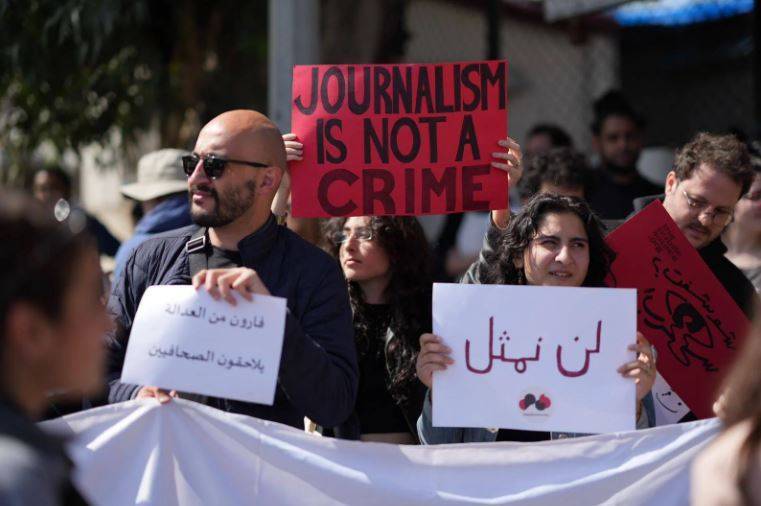
Protesters during a sit-in in solidarity with journalist Lara Bitar, in front of the Anti-Cybercrime Bureau in Hazmieh, on April 6, 2023. (Credit: Mohamad Yassin/L'Orient Today)
BEIRUT — The Lebanese judiciary issued a verdict Monday to imprison journalist Dima Sadek, according to court documents seen by L'Orient Today.
As uncommon as it is in Lebanon, this is not the first time that a journalist is incarcerated or sentenced to prison in the country. Others have also been assassinated over the years, though that's another story for another day.
Here are the Lebanese journalists who were sentenced to prison in the past six years, including Sadek:
Dima Sadek, currently a journalist at MTV
Sadek was sentenced in July 2023 to one year in prison as the result of a lawsuit filed by the head of the Free Patriotic Movement (FPM), Gebran Bassil, who accused her of defamation and slander three years ago, according to court documents seen by L’Orient Today.
Sadek communicated the details of the verdict in a video posted on Twitter on Tuesday, in which she explained she must settle a compensation of LL110 million to the FPM.
The lawsuit was filed in February 2020 accusing Sadek and activist Gino Reaidy of "disseminating fake news" and "publishing a video falsely attributed to the FPM containing incitements to communal and racist hatred that could spark sectarian strife." Sadek and Reaidy had accused FPM members of assaulting two young men from Tripoli a few months after the start of massive protests.
Radwan Mortada, a journalist at the al-Akhbar newspaper
Mortada was sentenced in November 2021 by Lebanon’s Military Court to a 13-month prison sentence, in absentia, on charges of defaming the Lebanese army. The Military Court has a mandate of trying military and security personnel who commit crimes while on duty.
In an Al-Jadeed interview, Mortada said that the army had acted like "jackasses" regarding their failure to stop the ammonium nitrate stored at the Beirut port from exploding on Aug. 4, 2020.
Sentencing in Lebanese military courts is "inconsistent" and "arbitrary," and those sentenced face a "limited right of appeal," a 2017 Human Rights Watch report said.
Adam Chamseddine, Al-Jadeed TV correspondent
Chamseddine was sentenced in absentia, in March 2019, to three months in prison by a military court over a Facebook post that criticized Lebanon's State Security agency. The Facebook post in question criticized the agency for arresting a Syrian man, allegedly because he had AIDS, and disclosing the suspect’s name in an official statement.
Michel Kanbour, owner and editorial director of the website Lebanon Debate
Kanbour was sentenced to six months imprisonment and ordered to pay a fine of LL10 million (around $7,000 back then) in March 2018 after a successful libel action by the then-Director General of Customs, Badri Daher.
Fida' Itani, a free-lancer working with various outlets
Itani was sentenced in absentia to four months in prison and a fine in June 2018, when he posted online criticism of then-Foreign Minister Gebran Bassil over the treatment of refugees. The comments in question dated back to a Facebook post from June 30, 2017.
Hanin Ghaddar, former managing editor of the news website NOW Lebanon
Ghaddar was been sentenced in January 2018, in absentia, to six months in prison by a military court for criticizing the army during a conference held in the United States in 2014. Ghaddar said at the time that in Lebanon, "Sunnis are being clamped down by Hezbollah and the Lebanese army, while the Hezbollah militia are the untouchables."
Ahmad al-Ayoubi, a free-lancer working with various outlets
Al-Ayoubi was jailed in November 2017 for defamation following a successful suit by former Prime Minister Saad Hariri’s office. In an article Ayoubi had published on the al-Janoubia website on Nov. 12 that year, the journalist accused Hariri of being behind the diplomatic crisis that was taking place at the time between Lebanon and Saudi Arabia.
Jad Shahrour, a communications officer for the civil society group Samir Kassir Foundation, told L’Orient Today that every case of a journalist incarcerated in Lebanon has been different. “Some weren’t effectively jailed because they had the option of paying a fine, instead of serving prison time, while others had appealed and their case was postponed a couple of years, and then were totally forgotten about. Others had been rescued by political intervention.”
Way earlier in Lebanese history, two more cases can also be cited when talking about prison sentences for journalists:
Georges Naccache, journalist and founder of L'Orient
Naccache was a Lebanese journalist, poet, politician and diplomat, and the founder of the L'Orient newspaper, one of the precursors of today's L'Orient-Le Jour. He is the author of a famous editorial published on March 10, 1949, entitled: "Two negations do not make a nation," which earned him three months in prison, and six months suspension from L'Orient.
In his editorial, published six years after the end of the French Mandate, Naccache was criticizing the Lebanese system in which the Lebanese Christians would turn their backs on the West, while their Muslim compatriots would renounce their claim to a great Arab nation, in order to form an independent Lebanon.
Ghassan Tueni, editor-in-chief of Annahar
Tueni was a Lebanese journalist, politician and diplomat who headed Annahar, one of the Arab world's leading newspapers. In 1949, he protested in an article against the trial that condemned the Syrian Social Nationalist Party leader Antoun Saadeh to death. The article caused a political uproar and he spent two months and 20 days in prison because of his stance. Until the 1970s he was sent to jail on several occasions to defend freedom of expression.
As uncommon as it is in Lebanon, this is not the first time that a journalist is incarcerated or sentenced to prison in the country. Others have also been assassinated over the years, though that's another story for another day.Here are the Lebanese...

